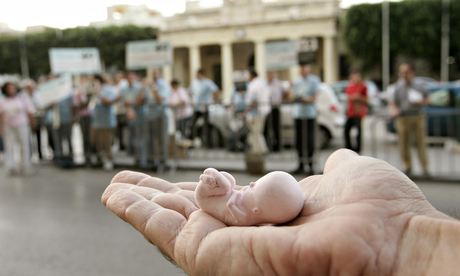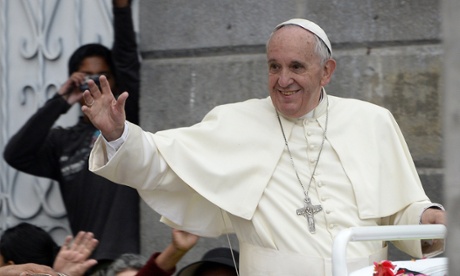The fate of an 11-year-old girl who became pregnant after being raped by a family member has unleashed a fierce debate between human rights activists and the Catholic church in Bolivia, as religious groups seek to force her to complete the pregnancy and give birth.
The girl was impregnated after being repeatedly raped and suffering other sexual abuse by the father of her stepfather in the town of Yapacaní, in Bolivia’s eastern Santa Cruz region.
The girl was living with her sisters and 61-year-old step-grandfather, who is now in jail for the crime, because her parents were in La Paz working.
The case has thrown into sharp relief the gaping holes in the state’s protection for women and girls in Bolivia, which has one of highest levels of inter-familiar sexual violence and abuse in Latin America, and what some activists call a culture of rape.
The intervention of the Catholic church is also being severely questioned, after religious groups contacted the mother of the victim and persuaded her to oppose the termination of the pregnancy, a move which has prompted legal action by the Bolivian human rights ombudsman’s office.
“The girl didn’t even know what it meant to be pregnant; she told her cousin that she felt something moving inside her tummy. Her cousin told her mother – the girl’s aunt – who reported it to the police,” said Ana Paola García, the executive director of La Casa de la Mujer, a Bolivian women’s rights NGO.
The girl was taken to the Percy Boland Women’s hospital in the city of Santa Cruz where, by law, as an underage rape victim she was due to have the pregnancy terminated last Friday. A 2014 constitutional ruling made interrupting a pregnancy legal in the case of rape without the need to obtain a court order, García said.
But the child’s mother, accompanied by a woman claiming to be a lawyer for the church, intervened, saying the girl had changed her mind, García said. The girl was removed from hospital and taken to a centre for adolescent mothers.
“There is evidently manipulation by the Catholic church which has practically kidnapped the girl and silenced the mother,” García said. “They are violating her human rights.”
“She is being obliged to continue with a pregnancy which puts her life at risk,” she added.
Susana Inch, a spokesperson for the Bolivian Bishops Conference, told local media on Wednesday: “We have the ethical and legal obligation to protect the life of the baby, both lives must be protected.”
In a statement the archdiocese of Santa Cruz said “one crime does not solve another crime”, offering free lodging and attention for the girl and the unborn child.
But Bolivia’s human rights ombudswoman, Nadia Cruz, said her office would be seeking criminal proceedings against the medical staff at the hospital, the archdiocese of Santa Cruz and the mother of the girl for breach of duty of care and human trafficking for the purpose of forced pregnancy.
She added her office had filed for precautionary measures before the Inter-American Commission of Human Rights in the case.
“We repudiate and reject that the church uses its influence and power to meddle in public policies related to sexual and reproductive rights or to take actions related to underage victims of sexual violence,” Cruz said. “Bolivia is a secular state.”
In a statement, the United Nations in Bolivia said that to “submit a minor to a forced pregnancy was classified as torture”.
According to figures from the Casa de la Mujer, in 2020 39,999 pregnancies of girls under age 18 were reported in Bolivia, meaning that about 104 minors become pregnant each day in Bolivia, of whom an average of eight are under 15 years of age.











